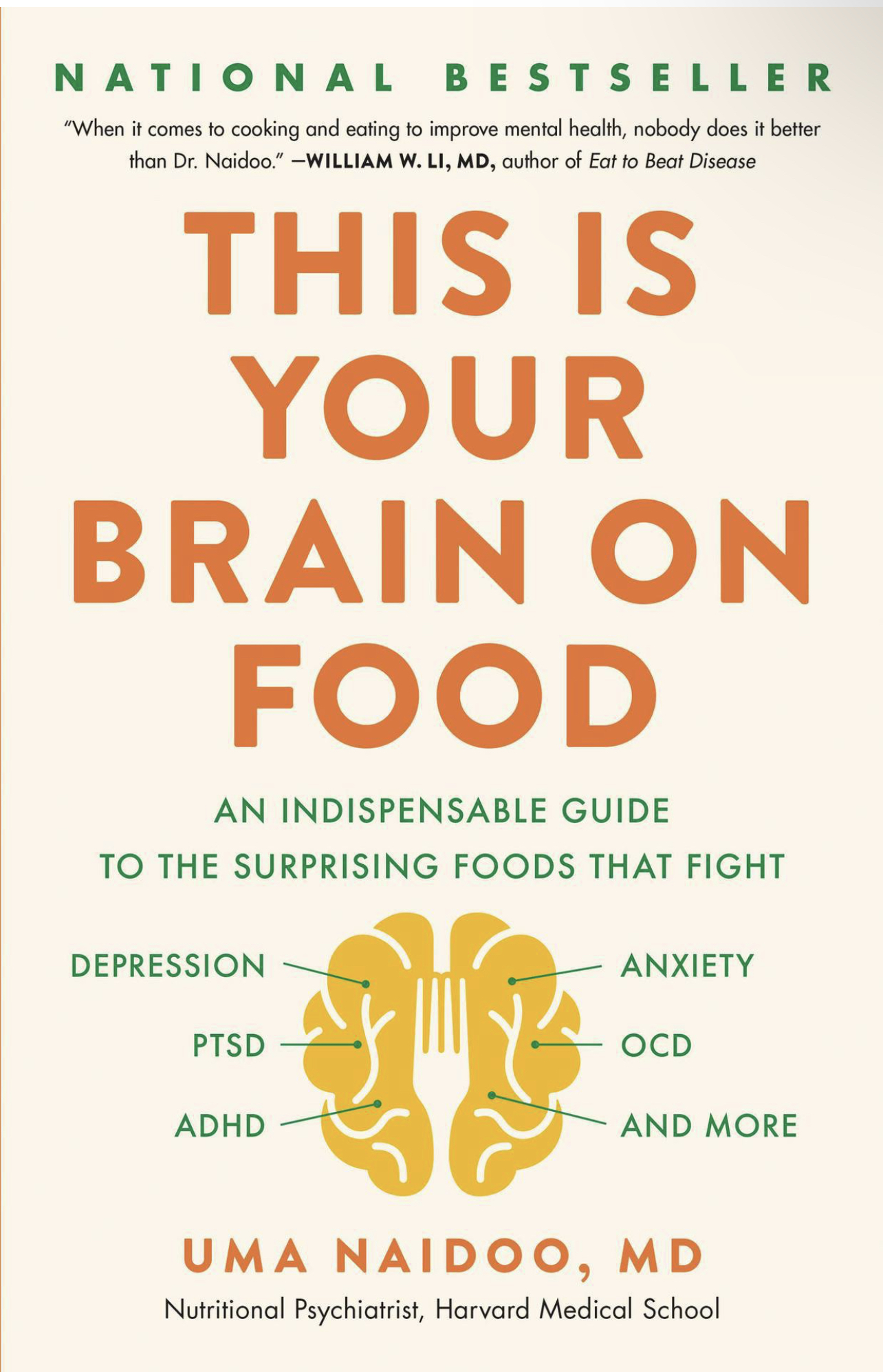This is Your Brain on Food Chapter 2. Depression Probiotics, Omega-3s, and the Mediterranean Eating Pattern
Author: Uma Naidoo Publisher: New York, NY: Little Brown Spark. Publish Date: 2020 Review Date: Status:📚
Annotations
37
food changes the types of bacteria present in your gut microbiome. Your gut bacteria may become less diverse as a result of your diet, which may cause the bad bacteria to outgrow the good bacteria, triggering a cascade of negative health effects. Food can also influence the chemical messages these bacteria send from your gut up to your brain along the vagus nerve—signals that can make you feel either depressed and drained or uplifted and energized. Animal research first led scientists to theorize that people who are depressed have different populations of gut bacteria than those who are not depressed. For instance, in mice, when the brain’s main center for smell is surgically removed, the mice exhibit depression-like behavior. These changes were accompanied by alterations in gut bacteria. In other words, inducing depression in mice changes their gut activity and bacteria. Studies in humans appear to confirm this hypothesis. In 2019, psychiatrist Stephanie Cheung and her colleagues summarized findings from six studies3 that looked at gut health in patients with depression. They reported that patients with major depressive disorder had at least fifty types of bacterial species in their gut microbiome that were different from those of control subjects without major depressive disorder. Recent research suggests that bacterial species associated with higher quality-of-life indicators are depleted in depressed subjects, while bacteria that cause inflammation are often found in higher numbers in people suffering from depression. This tells us that inflammation and depression are closely linked.
400
- Rao TS, Asha MR, Ramesh BN, Rao KS. Understanding nutrition, depression and mental illnesses. Indian Journal of Psychiatry. 2008;50(2):77–82.
400
- Cheung SG, Goldenthal AR, Uhlemann A-C, Mann JJ, Miller JM, Sublette ME. Systematic review of gut microbiota and major depression. Frontiers in Psychiatry. 2019;10:34. doi:10.3389/fpsyt.2019.00034.
38
Probiotics are live bacteria that convey health benefits when eaten. Probiotic-rich foods contain beneficial bacteria that help your body and brain. An animal study in 2017 from the University of Virginia School of Medicine indicated that Lactobacillus, a single gut bacterium commonly found in live cultures in yogurt, can reverse depression in rats. This bacterium is often an ingredient in human probiotic supplement formulations. More recently, similar findings have been established in humans as well.
38
Prebiotics are essentially food for helpful bacteria, certain types of fiber that we cannot digest but the good bacteria in our guts can. For probiotics to be effective, it is helpful for them to have prebiotic foods available in the gut to digest. Probiotics break down prebiotics to form short-chain fatty acids that help reduce gut inflammation, block the growth of cancerous cells, and help the growth of healthy cells. In 2010, Michael Messaoudi and his colleagues studied fifty-five healthy men and women who were randomly assigned to receive either a daily probiotic formula or a placebo for thirty days.4 Before and after treatment, the research subjects filled out questionnaires about their mood. They also provided urine samples so that their levels of cortisol, the body’s main stress hormone, could be checked. Compared to the placebo group, those in the probiotic group reported less depression, and urinary levels of cortisol were lower, indicating that their brains were less depressed and less stressed. Why was this the case? Certain species of gut bacteria have the ability to boost levels of brain chemicals such as gamma-aminobutyric acid, which may speed relief from depression and other mental health conditions.5
400
- Messaoudi M, Lalonde R, Violle N, et al. Assessment of psychotropic-like properties of a probiotic formulation (Lactobacillus helveticus R0052 and Bifidobacterium longum R0175) in rats and human subjects. British Journal of Nutrition. 2010;105(5):755–64. doi:10.1017/s0007114510004319.
400
- Clapp M, Aurora N, Herrera L, Bhatia M, Wilen E, Wakefield S. Gut microbiota’s effect on mental health: the gut-brain axis. Clinical Practice. 2017;7(4):987.
39
Probiotics are available in supplements, but it’s preferable to increase your levels of friendly bacteria through dietary sources. Yogurt with active cultures is one of the best sources of probiotics; just avoid fruited yogurts high in added sugars. Other probiotic-rich foods include tempeh, miso, and natto (fermented soybean products); sauerkraut; kefir (soured yogurt); kimchi (Korean pickle); kombucha (a fermented tea drink); buttermilk; and select cheeses such as cheddar, mozzarella, and Gouda. Examples of prebiotic-rich foods include beans and other legumes, oats, bananas, berries, garlic, onions, dandelion greens, asparagus, Jerusalem artichokes, and leeks.
